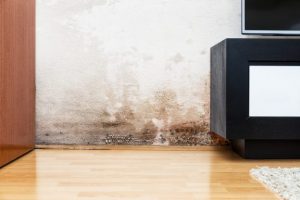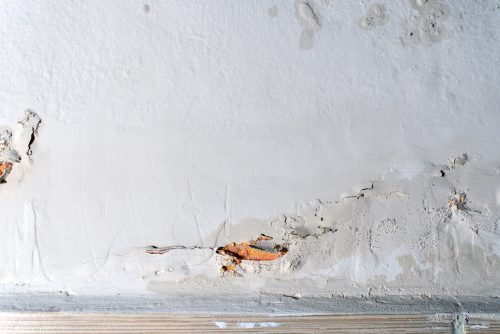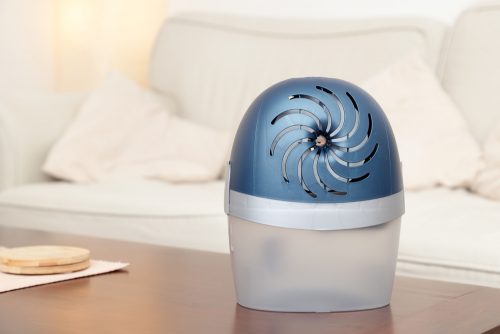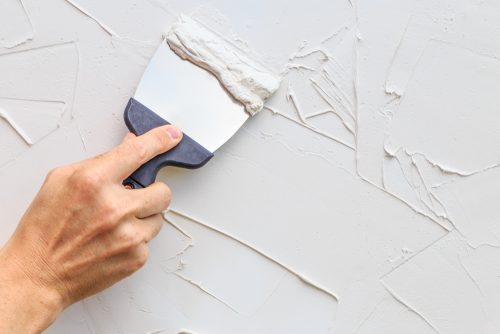How to Fix Moisture Problems in Walls

The problems that moisture can cause for walls can be a headache for several reasons. First off, it causes paint to peel. Secondly, moisture leaves behind real eyesores like mold as well as unpleasant odors that affect air quality.
While the problem might only show in certain areas of your home, you really should track down the source. Leaving moisture problems unresolved could later become a big structural problem and could also become a trigger for allergies and other health conditions.
How do walls get humid? What can you do to get rid of humidity? This is a common problem. So, in today’s post, we’re going to go over the main reasons as well as some ways to eliminate it or reduce its effects.
The causes of moisture problems
Most people believe that the moisture that harms walls always comes from the outside. However, that’s not always the case. There are two types of issues that you should be aware: capillary action and condensation.

1. Capillary action
Walls normally absorb moisture from the outside of the wall, but it can also happen the other way around. More often than not, the leaks happen outside of the wall, normally near cracks on the walls or areas that aren’t covered properly.
Without proper treatment, this can seriously damage home structures, even to the point of being dangerous for the home members. In addition to deteriorating walls, the moisture that’s absorbed by capillary action can also damage floors and ceilings.
2. Condensation
This problem is fairly common in homes, especially in older structures. Many people ignore it or don’t understand it because they think that mold and moisture problems can only come from exterior sources.
The problem starts when inside a room, water vapor comes into contact with cold surfaces. When it condenses, it forms little water drops that pass through walls, leaving dark spots behind.
Kitchens and bathrooms regularly deal with condensation. However, it can also occur on decks and backyards that have a lot of plant life.
How can you fix humidity problems in your walls?
You need to repair the areas with cracks or damages. Though you can find specialized paints and other products to minimalism the issue, they usually can’t fix it completely.
Let’s take a look below at some other recommendations for ending moisture problems:
Use humidity-controlling appliances

You don’t have to wait for the first signs of a moisture problem to start until doing something about it. One of the best ways to prevent these kinds of issues is installing humidity sensors. You can install them with your air conditioning system.
They use a special technology that can detect any rises in humidity levels. Additionally, they can also feature a dehumidifier that comes into action when humidity levels are above normal.
Make sure you have good ventilation
Opening your doors and windows is a simple way of fighting against wall moisture problems, especially those that arise from condensation. These simple actions are a natural way to get air moving. It also lets sunlight in, which helps evaporate any excess moisture.
Installing insulation
Insulation is great for preventing any exterior moisture from damaging your home’s internal structure.
There are all kinds of insulation for walls. Some options don’t require any installation and can be used in home exteriors. Other options include mats, rugs or tin.
Proper wall covering
Houses that are prone to high humidity levels require more thought when choosing paints or paneling. In addition to a nice coat of paint, you’ll need to make sure that it contains properties that block out moisture. On the same note, using a ceramic base for better results is also a good idea.
Repairing wall damage

As we mentioned earlier, the key for preventing marks from reappearing on your walls is fixing any cracks or damage. So, the first thing that you’ll need to do is cover any of your outer and interior walls that are damaged
You really should check them regularly, making any necessary fixes. Waterproofing your inner walls is also a great preventative measure for moisture problems.
Take care of any leaks
Be careful! In many cases, moisture problems that happen in walls result from leaky pipes. If a pipe bursts, the moisture can spread to your walls. In such situations, contacting an expert who can fix the problem with the right materials is essential.
Do you have moisture problems at home? Try to identify the root and decide the best way to solve it. If you’re unsure about anything, contact an expert.
The problems that moisture can cause for walls can be a headache for several reasons. First off, it causes paint to peel. Secondly, moisture leaves behind real eyesores like mold as well as unpleasant odors that affect air quality.
While the problem might only show in certain areas of your home, you really should track down the source. Leaving moisture problems unresolved could later become a big structural problem and could also become a trigger for allergies and other health conditions.
How do walls get humid? What can you do to get rid of humidity? This is a common problem. So, in today’s post, we’re going to go over the main reasons as well as some ways to eliminate it or reduce its effects.
The causes of moisture problems
Most people believe that the moisture that harms walls always comes from the outside. However, that’s not always the case. There are two types of issues that you should be aware: capillary action and condensation.

1. Capillary action
Walls normally absorb moisture from the outside of the wall, but it can also happen the other way around. More often than not, the leaks happen outside of the wall, normally near cracks on the walls or areas that aren’t covered properly.
Without proper treatment, this can seriously damage home structures, even to the point of being dangerous for the home members. In addition to deteriorating walls, the moisture that’s absorbed by capillary action can also damage floors and ceilings.
2. Condensation
This problem is fairly common in homes, especially in older structures. Many people ignore it or don’t understand it because they think that mold and moisture problems can only come from exterior sources.
The problem starts when inside a room, water vapor comes into contact with cold surfaces. When it condenses, it forms little water drops that pass through walls, leaving dark spots behind.
Kitchens and bathrooms regularly deal with condensation. However, it can also occur on decks and backyards that have a lot of plant life.
How can you fix humidity problems in your walls?
You need to repair the areas with cracks or damages. Though you can find specialized paints and other products to minimalism the issue, they usually can’t fix it completely.
Let’s take a look below at some other recommendations for ending moisture problems:
Use humidity-controlling appliances

You don’t have to wait for the first signs of a moisture problem to start until doing something about it. One of the best ways to prevent these kinds of issues is installing humidity sensors. You can install them with your air conditioning system.
They use a special technology that can detect any rises in humidity levels. Additionally, they can also feature a dehumidifier that comes into action when humidity levels are above normal.
Make sure you have good ventilation
Opening your doors and windows is a simple way of fighting against wall moisture problems, especially those that arise from condensation. These simple actions are a natural way to get air moving. It also lets sunlight in, which helps evaporate any excess moisture.
Installing insulation
Insulation is great for preventing any exterior moisture from damaging your home’s internal structure.
There are all kinds of insulation for walls. Some options don’t require any installation and can be used in home exteriors. Other options include mats, rugs or tin.
Proper wall covering
Houses that are prone to high humidity levels require more thought when choosing paints or paneling. In addition to a nice coat of paint, you’ll need to make sure that it contains properties that block out moisture. On the same note, using a ceramic base for better results is also a good idea.
Repairing wall damage

As we mentioned earlier, the key for preventing marks from reappearing on your walls is fixing any cracks or damage. So, the first thing that you’ll need to do is cover any of your outer and interior walls that are damaged
You really should check them regularly, making any necessary fixes. Waterproofing your inner walls is also a great preventative measure for moisture problems.
Take care of any leaks
Be careful! In many cases, moisture problems that happen in walls result from leaky pipes. If a pipe bursts, the moisture can spread to your walls. In such situations, contacting an expert who can fix the problem with the right materials is essential.
Do you have moisture problems at home? Try to identify the root and decide the best way to solve it. If you’re unsure about anything, contact an expert.







